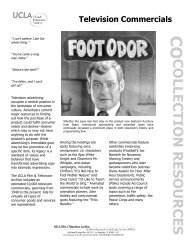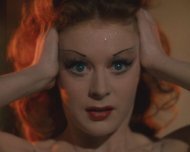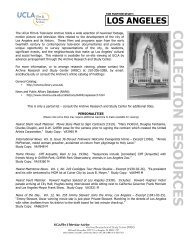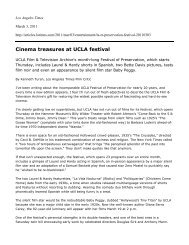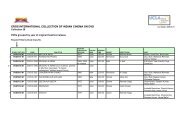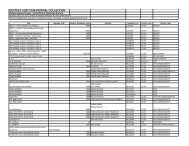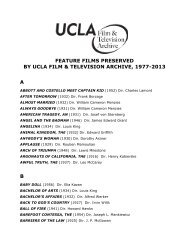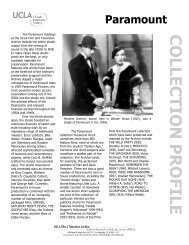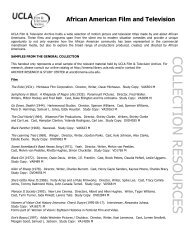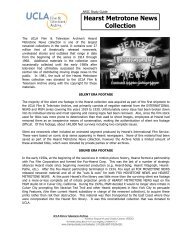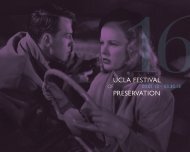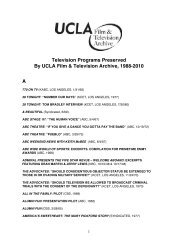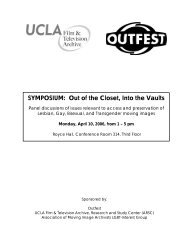"Heroic Grace" catalog - UCLA Film & Television Archive
"Heroic Grace" catalog - UCLA Film & Television Archive
"Heroic Grace" catalog - UCLA Film & Television Archive
Create successful ePaper yourself
Turn your PDF publications into a flip-book with our unique Google optimized e-Paper software.
LAST HURRAH FOR CHIVALRY [HAO XIA]<br />
Hong Kong 1979 Director: John Woo<br />
John Woo has often said that the self-sacrificing gangsters in A BETTER TOMORROW (1986) and THE KILLER (1988) were really wuxia (chivalrous<br />
knights) in modern drag. And this absorbing 1979 costume picture proves his point. Strongly influenced by the films of Woo’s directorial<br />
mentor, Zhang Che, LAST HURRAH is a mournful meditation on the decline of the old swordfighterly virtues, which live on only as the<br />
cherished illusions of a few high-minded weirdoes.<br />
The central action unfolds in an almost totally cynical, mercenary world. “You don’t keep your promises,” one character complains, and<br />
his rival cheerfully agrees: “That’s the secret of my success!” A key subplot centers upon a single-minded glory-seeking fighter, Fung Hakon’s<br />
Pray (“If you touch my sword, you better pray”), who is so fixated on demonstrating his prowess that he attacks a celebrated knight’s<br />
family just to draw him out of hiding. The pivotal character, Gao (Lau Kong), is duplicity personified: when he tries to recruit a couple of<br />
idealistic fighters, Zhang (Wai Pak) and Green (Damian Lau Chung-yan), for a mission of revenge, Gao is dismayed to learn that they can’t<br />
be bought. His only hope is manipulating the rueful “blood brothers” into doing this dirty work for (misguided) reasons of their own.<br />
The production values may be scrappy (threadbare studio exteriors, shiny plastic wigs) but this is recognizably a movie with a modern<br />
sensibility. There’s an effort to make the characters talk and behave naturally, and the emotions feel authentic—as does the grim sense of<br />
a fog of amorality settling over the jiang hu.<br />
—David Chute<br />
Studio: Golden Harvest. Producer/Screenplay: John Woo. Cinematography: Yu Qing, Zhu Zhangyao. Martial Arts Directors: Fung Hak-on, Huang<br />
Ha, Alan Chui Chung-san. Editor: Peter Cheung Yiu-chung. Cast: Wai Pak, Damian Lau Chung-yan, Lau Kong, Wei Qiuhua, Fung Hak-on.<br />
35mm, in Mandarin with English subtitles, 107 min.<br />
Print Source: FORTUNE STAR Entertainment (HK) Ltd.<br />
JOHN WOO (Wu Yusen)<br />
John Woo joined Cathay studios as a production assistant in 1969. Two years later<br />
he moved to Shaw Brothers and became an assistant director to martial arts master<br />
Zhang Che. Woo made his directorial debut in 1973 with THE DRAGON TAMERS, and<br />
later tried his hand at opera and wuxia revival in films such as PRINCESS CHANG<br />
PING (1976) and LAST HURRAH FOR CHIVALRY (1979)—early efforts which display hints<br />
of the sweeping camera work, heroic pathos and sophisticated action choreography<br />
that would become the elements of Woo’s signature style. In 1983 the director<br />
began a collaboration with actor Chow Yun-fat on an acclaimed series of contemporary<br />
gangster films, including A BETTER TOMORROW (1986), THE KILLER (1989) and<br />
HARD-BOILED (1992). Woo relocated to Los Angeles in 1992. He continues to create<br />
with his business partner Terence Chang through their production company Lion<br />
Rock Productions. His most recent credits are FACE/OFF (1997), MISSION: IMPOSSIBLE<br />
II (2000) and WINDTALKERS (2002).<br />
48<br />
FRIDAY MARCH 14



